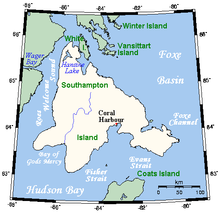The East Bay (Qaqsauqtuuq) Migratory Bird Sanctuary, Qaqsauqtuuq Migratory Bird Sanctuary,[2] or Refuge d'oiseaux de la baie Est[3] is a migratory bird sanctuary in the Kivalliq Region, Nunavut, Canada. It is located in East Bay, an arm of Hudson Bay, in southeast Southampton Island. The nearest community is Coral Harbour, 35 km (22 mi) to the west.[2]
It is one of two bird sanctuaries on the island, the other being the Harry Gibbons Migratory Bird Sanctuary, situated 193 km (120 mi) to the southwest.[4]
Established 1 January 1959, and consisting of 112,811 ha (1,128.11 km2; 435.57 sq mi)[2] it is rated Category IV by the International Union for Conservation of Nature. Of its 1,124 km2 (434 sq mi) in overall size, 286 km2 (110 sq mi) is a marine area with marine, intertidal, and subtidal components.[5]

Southampton Island has a severe subarctic climate (Köppen Dfc) which transitions into a tundra climate (ET). Like almost all of Nunavut, Southampton Island is entirely above the tree line. Coral Harbour has never gone above freezing in January, February and March (although the latter has recorded 0.0 °C (32.0 °F). Due to the frozen nature of Hudson Bay, there is a severe seasonal lag until June, especially compared to more continental areas such as Fairbanks despite much sunshine and perpetual twilight at night. Due to the drop of solar strength and the absence of warm water even in summer, temperatures still drop off very fast as September approaches. Cold extremes are severe, but in line with many areas even farther south in Canada's interior.
The sanctuary's habitat consists of three main types, water, unvegetated land, and moist or wet vegetated tundra.[8] This can be further broken down as dry heath, gravel ridge, intertidal zone, moss carpet, scrub willow, and sedge meadow.[9]
A 1986 list of plants in the sanctuary found over 100 species of algae, fungi, lichens, bryophytes, and vascular plants.[10]
Plants found in the sanctuary include:[10]
Birds listed by the Committee on the Status of Endangered Wildlife in Canada (COSEWIC) or the Species at Risk Act (SARA) are noted as to their status.[11] Bird species include:[2][12][13]
Mammals in the area are mainly Arctic fox (Alopex lagopus), Arctic hare (Lepus arcticus), brown (Lemmus sibiricus), and collared lemmings (Dicrostonyx groenlandicus). Barren-ground caribou (Rangifer tarandus) were reintroduced from Coats Island in 1967.Scb Wolves (Canis lupus), red foxes (Vulpes vulpes), and wolverines (Gulo guloSc) are occasionally sighted.[14]
Marine mammals include Atlantic walrus (Odobenus rosmarus rosmarusScb), bearded seal (Erignathus barbatus), beluga whale (Delphinapterus leucasScb), bowhead whale (Balaena mysticetusScb), harbor seal (Phoca vitulina), harp seal (Pagophilus groenlandicus), narwhal (Monodon monocerosScb), polar bear (Ursus maritimus), ringed seal (Pusa hispidaScb), walrus (Odobenus rosmarus).[10]
East Bay/Native Bay is a Canadian Important Bird Area (#NU023) and a Key Migratory Bird Terrestrial Habitat (NU Site 44).[13]